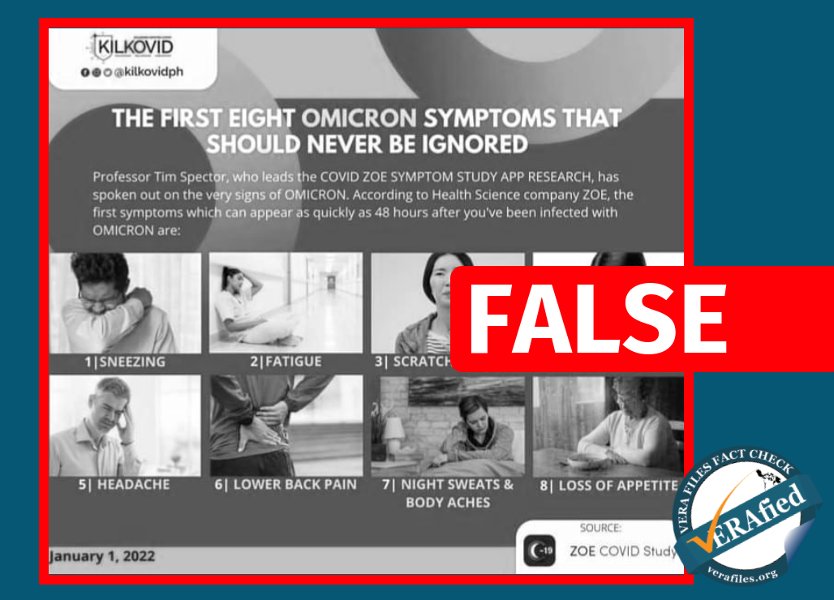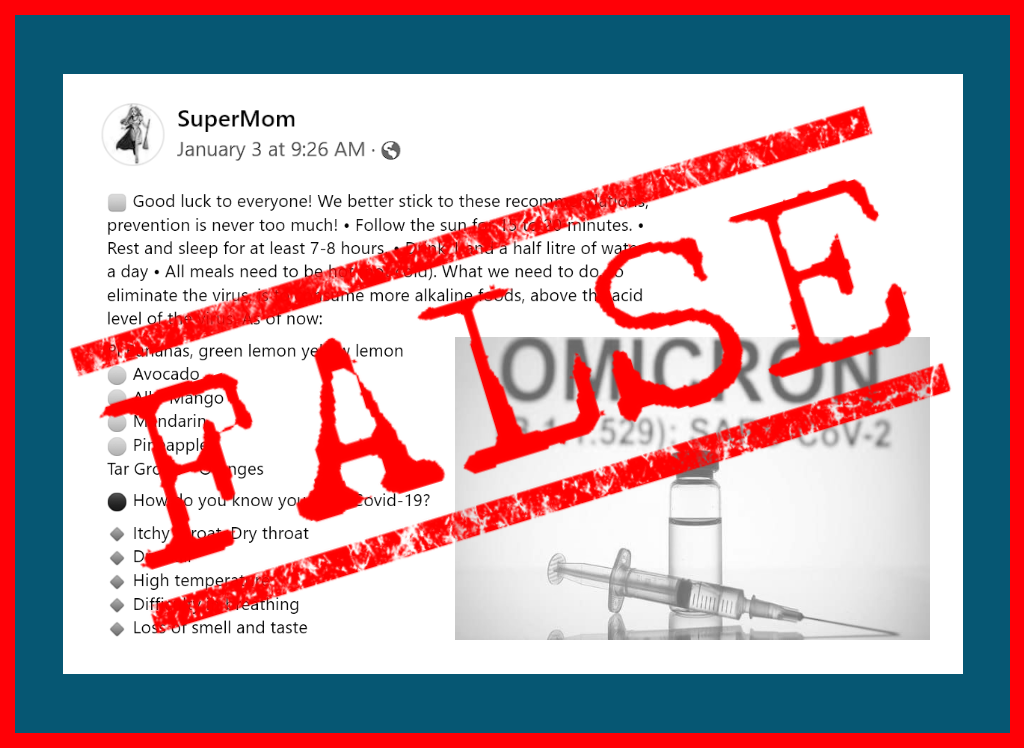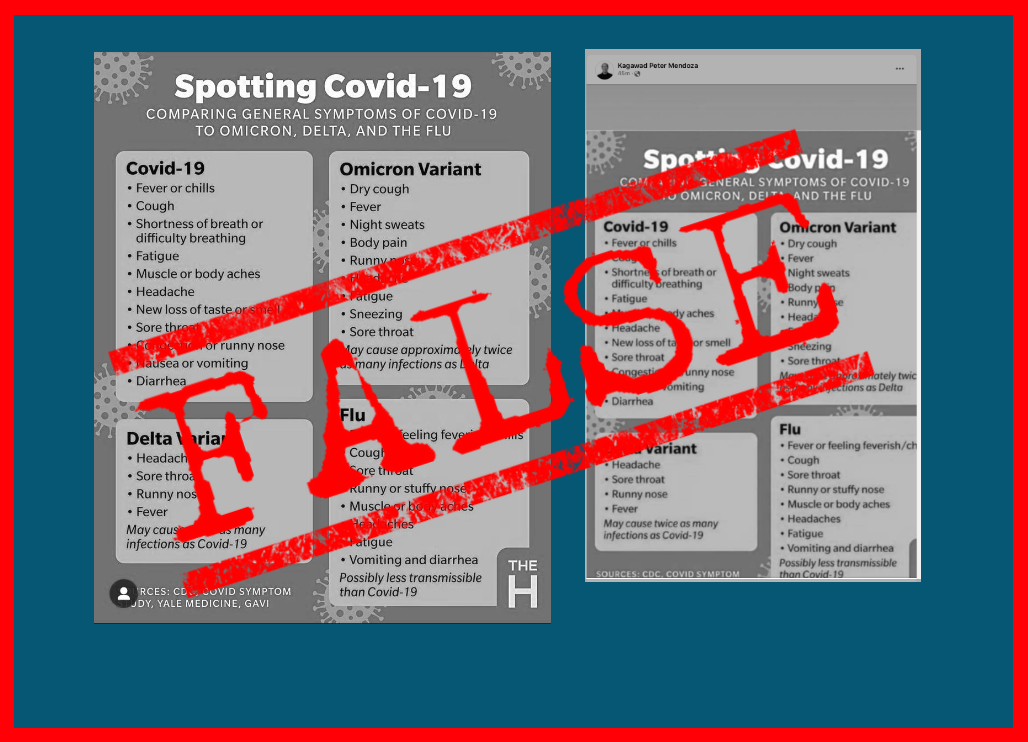Vice presidential candidate Willie Ong said in a health vlog that the common cold and the Omicron and Delta variants of the coronavirus disease 2019 (COVID-19) can be determined through the symptoms experienced by patients. This needs context.
Other health experts say that only genome sequencing can ascertain what COVID-19 variant a person has.
STATEMENT
In his vlog titled “Sipon, (Colds), Omi-cron or Del-ta: Paano Malalaman? – Payo ni Doc Willie Ong (Internist & Cardiologist)” posted on Jan. 10 on his official Facebook page as well as on his wife’s page, Ong enumerated five symptoms supposedly indicating infection with the Omicron variant:
“Pag kayo ay may lagnat, malamang Omicron na iyan. Pag kayo ay may chills, nanginginig, Omicron na iyan. Pag kayo ay may sore throat, may headache, malamang sa panahon ngayon Omicron na ‘yan. Pag hirap huminga, talagang Omicron na, malala na iyon.”
(If you have a fever, most likely that’s Omicron. If you have chills, shivers, that’s Omicron. If you have a sore throat, a headache, most likely, nowadays that’s Omicron. If it’s hard to breathe, that’s a worse form of Omicron.
Source: Doc Willie Ong’s official Facebook page, Sipon, Omi-cron or Del-ta…, Jan. 10, 2022
He also mentioned one symptom that allegedly denotes infection with the Delta variant:
“Kapag nawala ‘yung pang-amoy mo, di mo malasahan yung pagkain mo, Delta ‘yon. (If you lose your sense of smell and you can’t taste your food, that’s Delta [variant].)”
Source: Doc Willie Ong’s official Facebook page, Sipon, Omi-cron or Del-ta…, Jan. 10, 2022
The post has over 8,600 interactions on Ong’s official Facebook page and 791,000 on his wife’s page as of Jan. 19. It was posted on the same day Health Secretary Francisco Duque III said the Omicron has become the most widespread variant in the country.
FACT
While the common cold and COVID-19 have many similar signs and symptoms, health experts other than Ong said only genome sequencing can determine with certainty whether someone has the Omicron or the Delta variant.
“Symptoms cannot differentiate among the variants. Only whole genome sequencing can do that,” John Wong, a Filipino epidemiologist and senior technical advisor of public health research institution Epimetrics, Inc., said in reply to a question VERA Files Fact Check raised during a Jan. 14 webinar organized by the University of the Philippines (UP).
Whole genome sequencing refers to a laboratory procedure that determines the unique genetic fingerprint of an organism in one process, according to the United States Centers of Disease Control and Prevention (U.S. CDC).
This “allows scientists to identify SARS-CoV-2 and monitor how it changes over time into new variants, understand how these changes affect the characteristics of the virus, and use this information to better understand how it might impact health,” the U.S. CDC explained.
In the UP webinar, infectious disease specialist Franco Felizarta said, “In terms of symptomatology, you will not be able to differentiate between Delta and Omicron.” However, he said he has observed that the most common symptoms among patients with Omicron were sore throat, runny nose, diarrhea, and rashes.
Health experts convened by non-profit organization Meedan explained that “the different variants of SARS-CoV-2 cannot be determined by one’s symptoms because most symptoms overlap. The symptoms may also vary based on an individual’s vaccination status against the virus.”
Both COVID-19 and the common cold are caused by viruses that spread in similar ways and cause the same symptoms, according to the U.S. CDC. COVID-19 is caused by SARS-CoV-2, while the common cold is most often caused by rhinoviruses.
The symptoms for the Omicron variant that Ong mentioned are not yet definitive, based on initial research conducted around the world.
As reported in preliminary studies by the United Kingdom Health Security Agency (UK HSA), London-based health science company ZOE, the Norwegian Institute of Public Health, and the U.S. CDC, sore throat, runny nose, cough, headache, and fatigue were among the most-reported top symptoms of the Omicron variant.
Anthony “Tony” Leachon, former special adviser to the National Task Force on COVID-19, told VERA Files Fact Check in a Zoom interview that “nowadays, it’s very difficult to say you have Omicron, or you have Delta, because we don’t have genome sequencing for all patients.”
“You know, in my years of being a doctor, if you have a preliminary study and those variations come out, that’s correct. It’s just a matter of time before it goes trending,” said Leachon, a cardiologist.
Citing medical research and his experience in treating 700 to 1,000 patients since Jan. 2, Leachon said he believes certain symptoms differentiate the Omicron from the Delta variant.
“Omicron doesn’t attack the lungs. There’s fever, runny nose, raspy sore throat, and then you have a headache. Basically it’s flu-like but it also has muscle fatigue and general body pains. But the most predominant thing I see with my patients is sore throat,” he said.
“On the other end of Delta, you have loss of smell and taste. The predominant symptom for that is shortness of breath because it attacks the lungs,” he added.
In the study by the UK HSA dated Jan. 14 and the U.S. CDC’s report dated Dec. 17, 2021, loss of smell and taste was not frequently reported among those who got the Omicron variant.
Loss of smell or taste was reported in 13% of 182,133 Omicron cases, compared to 34% of 87,920 Delta cases, the UK HSA report noted. Only 8% out of 43 confirmed Omicron cases in the United States reported loss of taste or smell, as stated in the U.S. CDC’s report.
As of Jan. 6, the Department of Health maintained that “there is no information to suggest that the Omicron variant causes different symptoms of COVID-19.”
Leachon advised people who experience COVID-19 symptoms to isolate right away, take an antigen test if possible, and always wear face masks. He also said that Filipinos should be empowered to know the symptoms and practice steps to address the virus.
Antigen tests, which detect the presence of antibodies against the virus, are less sensitive than reverse transcription polymerase chain reaction tests (RT-PCR) which detect SARS-CoV-2, according to the U.S. CDC. As of Sept. 27, 2021, the Department of Health considers RT-PCR tests as the gold standard for detecting COVID-19, but recommends the use of antigen tests for people with symptoms of the disease.
“Every Filipino citizen should be able to trace, and test, and quarantine. They should be able to do home remedies, and increase their immunity by drinking lots of water, eating fruits and vegetables, and plenty of rest,” he said.
Have you seen any dubious claims, photos, memes, or online posts that you want us to verify? Fill out this reader request form.
Sources
Doc Willie Ong’s official Facebook page, Sipon, Omi-cron or Del-ta…, Jan. 10, 2022
Presidential Communications Operations Office, Talk to the People of President Rodrigo Roa Duterte, Jan. 10, 2022
United States Centers for Disease Control and Prevention, What is whole genome sequencing (WGS)?, accessed Jan. 19, 2022
United States Centers for Disease Control and Prevention, Genomic Surveillance for SARS-CoV-2, accessed Jan. 19, 2022
University of the Philippines, “OMICRON: What We Should Know & What We Should Do,” Jan. 14, 2022
University of the Philippines official Twitter account, Felizarta: In terms of symptomatology…, Jan. 14, 2022
University of the Philippines official Twitter account, Felizarta: Regarding symptoms…, Jan. 14, 2022
Meedan Health Desk, Is it possible to compare symptoms of the Delta and Omicron variants?, Jan. 14, 2022
United States Centers for Disease Control and Prevention, Basics of COVID-19, Nov. 4, 2021
United States Centers for Disease Control and Prevention, Common Colds: Protect Yourself and Others, accessed Jan. 19, 2022
UK Health Security Agency, SARS-CoV-2 variants of concern and variants under investigation in England | Technical briefing 34, Jan. 14, 2022
ZOE YouTube channel, Omicron spread slows but infections rising in older people, Jan. 6, 2022
Eurosurveillance.org, Outbreak caused by the SARS-CoV-2 Omicron variant in Norway, November to December 2021, Dec. 16, 2021
United States Centers for Disease Control and Prevention Morbidity and Mortality Weekly Report, SARS-CoV-2 B.1.1.529 (Omicron) Variant — United States, December 1-8, 2021, Dec. 17, 2021
Dr. Anthony “Tony” Leachon – Personal communication, Jan. 16, 2022
Department of Health (Philippines) official Twitter account, Worried about the possible threat of the more transmissible Omicron variant?…, Jan. 6, 2022
(Guided by the code of principles of the International Fact-Checking Network at Poynter, VERA Files tracks the false claims, flip-flops, misleading statements of public officials and figures, and debunks them with factual evidence. Find out more about this initiative and our methodology.)




